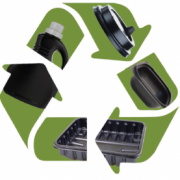More news
- Asian paint regulatory round up – Indonesian exterior paint still uses lead, warns W...
- Nigeria’s paint industry navigates regulatory changes and economic challenges amid p...
- Focus on the global coatings market: Global coatings market outlook
- Ask Joe Powder – October 2024
- Chinese paint majors look to domestic consumer sales as commercial real estate slumps

- More recycling of plastic waste which otherwise would be incinerated
- Favorable regulatory environment decisive for implementation
BASF, Quantafuel and Remondis have signed a Memorandum of Understanding (MoU) to jointly evaluate a co-operation in chemical recycling including a joint investment into a pyrolysis plant for plastic waste. It is intended that Remondis, one of the world’s leading waste and water management companies, supplies suitable plastic waste to the plant and BASF uses the resulting pyrolysis oil as feedstock in its production at Verbund as part of its ChemCyclingTM project. Quantafuel intends to provide the technology and to operate the plant. The company is a specialist for the pyrolysis of mixed plastic waste and the purification of the resulting pyrolysis oil; the technology is jointly developed and being held with BASF. The location of the pyrolysis plant will be evaluated together.
Each year, almost 20 million metric tons of plastic waste in Europe go unrecycled. By establishing chemical recycling as a complementary solution to mechanical recycling it is possible to bring back more plastic waste into the materials cycle, which would otherwise be incinerated. The pyrolysis technology can be used to process plastic waste streams that are not recycled mechanically, eg for technological or economic reasons.
To maximise a circular economy for plastics, the parties will identify which of the waste plastics provided by Remondis could undergo chemical recycling in future.
"BASF has set itself the goal to process 250,000t of recycled feedstock annually from 2025 onwards. In this regard, it is important to use feedstock derived from plastic waste that would otherwise not have undergone recycling,” said Dr. Lars Kissau, Senior Vice President Global Strategic Business Development at BASF’s Petrochemicals division. "Partnering with companies from the waste management and recycling sector, as well as innovative technology providers is an ideal constellation to build a sustainable circular economy model for previously non-recycled plastic waste. However, solving the plastic waste challenge will only be possible in a favorable regulatory environment.”
"Remondis and BASF are excellent partners for realising an ambitious project like this in Central Europe on a tight timeline, and operating it successfully for the long term,” stated Kjetil Bøhn, CEO of Quantafuel. "We are steadily moving forward in the ramp up of our initial plant in Skive and are happy to now start implementing the roll-out of the technology.”
Jürgen Ephan, Managing Director Remondis Recycling, pointed out the importance of the joint project: "In order to achieve the sustainability objectives set by the European Union in its visionary Green Deal, it is essential to increase recycling quotas wherever technically and economically feasible. We believe that chemical recycling can provide a meaningful contribution and are therefore happy to join forces with BASF and Quantafuel on the way towards a higher rate of recyclability.”
Legislation on EU and national level will create the framework for chemical recycling and therefore shape the ability how it can contribute to a more circular economy for plastics. This includes acknowledging that products based on chemically recycled feedstock are counted towards achieving recycled content targets.
Pyrolysis oil derived from plastic waste is fed into BASF’s Verbund production, thereby saving the same amount of fossil resources. Since the pyrolysis oil is inserted directly at the beginning of the chemical value chain, the final sales products have the exact same properties as products made from fossil feedstock. The share of recycled material is allocated to the end products according to a third-party certified mass balance approach which allows BASF to offer its customers certified products carrying the name affix CcycledTM.



